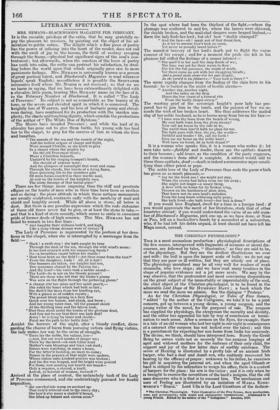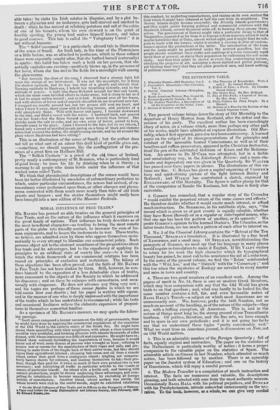THE CHRISTIAN PHYSIOLOGIST.*
THIS is a most anomalous production : physiological descriptions of the five senses, interspersed with fragments of sermons or moral dis- courses, are followed by tales, "illustrative," as they are said to be, of the physiology. But they are the drollest illustrations we ever met with: the bull is upon the largest scale of bulls : we do not say that they are poor or ill written, but they are utterly out of place. • The physiology moralized may be all very well for readers of weak stomachs, who love slops ; and we have read many treatises in the shape of popular evidences not a jot more acute. We may by the way observe, that the profoundest and most convincing disquisitions on the great subject of the immortality or imperishability of the soul, the chief object of the Christian physiologist, is to be found in the -admirable Last Days of Sir HIIMPFIRY DAVY ; a book which the more we read the more we admire. See the dialogue " Proteus." As for the Christian Physiologist, or Tales of Five Senses, "edited" by the author of the Collegians, we take it to be a joint concern, got up between a young divine, a young surgeon, and the young writer of the novel, for the purposes of sale. -The surgeon has supplied the physiology, the clergyman the morality and divinity-, and the editor has appended his tale by way of conclusion or termi- nation to each sense. After a sermon on the Eyes, for example, there is a tale of an old woman who lost her sight in one night in consequence of a cataract (the surgeon has not looked over the tales) ; and this is a punishment for expecting her son home from India too anxiously. The divine, we think, should have interposed here. Surely the Great Being he serves visits not so severely the too anxious longings of aged and widowed mothers for the embrace of their only child, the support and joy of the few latter days of earthly existence. The sense of Hearing is illustrated by a pretty tale of an ancient Irish harper, who had a deaf and dumb son, who suddenly recovered his hearing by the efficacy of prayer: unknown to his father, he exercises his gift in acquiring the paternal art, and when the aged 011amh or bard is obliged by his infirmities to resign his office, there is a contest of harpers for the place: his scin is the victor ; and it is only when he is brought to receive the investiture of the bard's insignia, that the old man discovers who it is that is to succeed him. The mechanism and uses of Feeling. are illustrated by an imitation of MARIA EDGE- WORTH'S "Ennui." Lord Ulla is the Lord Glenthorn of the fashion- • The Christian Physiologist. Tales illustrative of the Five Senses, their mechanism, uses, and government; with moral and explanatory introductions. Addressed to a young Friend. Edited by the author of the • Collegians." London, IWO. able tales: he visits his Irish estates in 'disguise, and by a plot be- tween a physician and an innkeeper, gets half-starved and smoked to death : when he has arrived at relishing potatoes and salt at the cabin of one of his tenants, whom his own steward is on the point of forcibly ejecting, the young lord makes himself known, and takes to good courses. This tale is called the " Voluptuary Cured :" it is not without humour.
The " Self-Consumed" is a particularly absurd tale in illustration of the sense of Smell. An Irish lady, in the time of the Phcenicians or a little before, was so attached to perfumes, which in those refined times were especially sought after, that she bathed herself (externally) in spirits : this habit has taken such a hold on her person, that she actually explodes one evening—positively blows up, in the presence of her lover, whom she has met in the fields for a moonlight walk among the glowworms.
"But towards the close of the song, I observed that a strange light fell upon the strings of my instrument. It was not the moonlight, for it flung the shadow upwards, and its hue was that of a ghastly and whitish blue. Turning suddenly to Maolruna, I beheld her trembling violently, and in the attitude of prayer. A light blue flame flickered around her face and hands, which she made some terrified efforts to shake away, but it clung to her as if it had its origin within herself ; and so it had. It spread over all her frame, and with shrieks of terror and of anguish she called on me to aid and save her.
I wrapped my mantle around her, but her groans still rent my heart, and when I drew it away, there came with it burning tresses, and particles of a cold phosphoric flame. Wild with horror and agony, I hurried downward to the lake, and filled a vessel with the water. I hastened back, and poured it on her head—but the flame burned up more fiercely than before. Her shrieks made the vale re-echo, and my own cries of terror, joined to hers, brought many to the place. Again I hurried to the lake, but on my return, I found only a crowd of terrified people gazing on a heap of black and clammy ashes that covered the dallan, the neighbouring shrubs, and lay all around the place where Maolruna had been sitting."
This is an illustration of the- sense of Smell; but the author does not tell us what sort of an odour this droll kind of pastille gives out, —something, we should suppose, like the conflagration of the pre- mises of a great firm on Holborn Hill. The "Selfish Crotarie " is a priest of the old times of Ireland, pretty nearly a contemporary of St. Senanus, who is particularly fond of good living : he loses his life by drinking when he is thirsty ; a warning to all people who drain bowls under the influence of that wicked sense called Taste.
We think that physiological descriptions of the senses would have been far better illustrated by anecdotes of extraordinary perfection to which, under particular circumstances, the senses had arrived, of ex- traordinary cures performed upon them, or other changes and pheno- mena connected with them much more nearly than tales of old Irish priests and harpers ; and the stories themselves might easily have been brought into a new edition of the Munster Festivals.



















 Previous page
Previous page